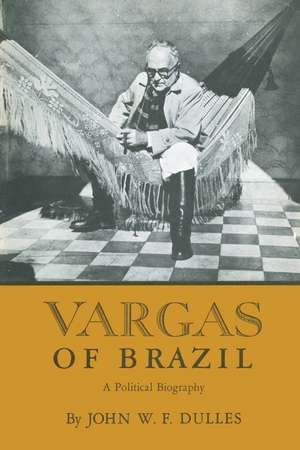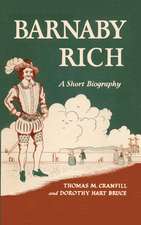Vargas of Brazil: A Political Biography
Autor John W. F. Dullesen Limba Engleză Paperback – 1967
Vargas was a consummate artist at politics. He climbed the political ladder through seats in the state and national legislatures to the post of federal Finance Minister and to the governorship of Rio Grande do Sul. His career then took him to the National Palace as Provisional President and as Constitutional President, and later as the dictator of his "New State." After his deposition in 1945 and a period of semiretirement, his continuing widespread popularity resulted in his successful come-back campaign in 1950 for the Presidency on the Labor Party ticket.
Vargas' contributions to Brazilian political and economic life were many and important. Taking advantage of the power which his political magic provided him, he brought Brazil from a loose confederacy of semifeudal states to a strongly centralized nation. He was a great eclectic, welding into his social, political, and economic policies what he found good in various programs. He was also a great opportunist in the sense that he adroitly took advantage of conditions and circumstances to effect his ends. He was intimately related to the revolutionary changes in Brazilian life after 1930.
Vargas, "Father of the Brazilians," attributed achievements such as these to power in his own hands. His foes, however, still feared the political wizard, and they cheered the military when it deposed him. After his return, "on the arms of the people," Vargas saw that the armed forces were determined to repeat history, and in 1954 he chose another path—suicide.
All of these exciting events are related in John W. F. Dulles's Vargas of Brazil: A Political Biography. Despite its emphasis on Vargas the politician and statesman, the reader comes to know Vargas the man.
For this portrait of Vargas and of Brazil the author has drawn much material from State Department papers in the National Archives and from other public sources, and from interviews with numerous persons who were participants in the events he describes or observers of them. The result is an interesting, revealing, valid account of an important people. Many illustrations supplement the text.
Preț: 341.43 lei
Nou
Puncte Express: 512
Preț estimativ în valută:
65.33€ • 68.21$ • 54.07£
65.33€ • 68.21$ • 54.07£
Carte tipărită la comandă
Livrare economică 05-19 aprilie
Preluare comenzi: 021 569.72.76
Specificații
ISBN-13: 9780292740785
ISBN-10: 0292740786
Pagini: 450
Dimensiuni: 152 x 229 x 15 mm
Greutate: 0.45 kg
Editura: University of Texas Press
Colecția University of Texas Press
ISBN-10: 0292740786
Pagini: 450
Dimensiuni: 152 x 229 x 15 mm
Greutate: 0.45 kg
Editura: University of Texas Press
Colecția University of Texas Press
Notă biografică
John W. F. Dulles (1913–2008) was University Professor of Latin American Studies at the University of Texas at Austin.
Cuprins
Acknowledgments
Chronological Table
Prologue
Book I: The Revolutionary Background, 1922–1929
Book II: The Election and Revolution of 1930
Book III: First Two Years of the Provisional Government
Book IV: The End of the Provisional Government, 1932–1934
Book V: The Constitutional Government, 1934–1937
Book VI: Early Years of the Estado Nôvo, 1937–1938
Book VII: The Estado Nôvo and a Warring World, 1939–1942
Book VIII: Brazil at War, 1942–1945
Book IX: The Fall of the Dictator
Book X: Out of Power, 1945–1950
Book XI: Constitutional President, 1951–1954
Epilogue
Résumé
Sources
Index
Chronological Table
Prologue
Book I: The Revolutionary Background, 1922–1929
Book II: The Election and Revolution of 1930
Book III: First Two Years of the Provisional Government
Book IV: The End of the Provisional Government, 1932–1934
Book V: The Constitutional Government, 1934–1937
Book VI: Early Years of the Estado Nôvo, 1937–1938
Book VII: The Estado Nôvo and a Warring World, 1939–1942
Book VIII: Brazil at War, 1942–1945
Book IX: The Fall of the Dictator
Book X: Out of Power, 1945–1950
Book XI: Constitutional President, 1951–1954
Epilogue
Résumé
Sources
Index
Descriere
A biography of the man who was the dominant public figure in Brazil from 1930 until 1954, a highly contradictory and controversial personality.






